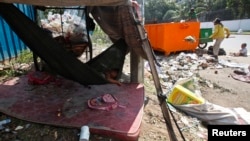The United Nations Development Program (UNDP) in Cambodia has reportedly “apologized” to the Cambodian government for publishing poverty statistics almost three times as high as the official estimate.
Pauline Tamesis, UN resident coordinator in Cambodia, reportedly made the apology to Chhay Than, planning minister, on Monday during a meeting.
Last month, the UNDP and the Oxford Poverty and Human Development Initiative released the Global Multidimensional Poverty Index, which estimated that more than a third of Cambodians live in poverty.
The approach taken by the report’s writers takes into account people’s health, education, and living standards, as well as income, which is the only measure the government uses in its own calculations. The UNDP’s formula was recommended in the U.N. Sustainable Development Goals.
The poverty measurement angered the Cambodian government, which has claimed success in eradicating poverty in Cambodia.
In a letter to UNDP country director Nick Beresford last week, Than said he read the media coverage about the poverty figure “with great surprise”.
“I am very disturbed by the fact that without prior consultation with the government before it went public, UNDP has issued this national poverty rate ... based on a new concept, multidimensional poverty, which has not been adopted by the government as the official poverty measurement approach,” he wrote.
The Planning Minister added that the new data on poverty by the UNDP would “confuse the public who are virtually statistically-illiterate” and bring the credibility of the government’s official poverty figure into question.
The official poverty rate is 13.5 percent, which only includes those who earn less than $1.90 a day.
“Ultimately the release of this information may have a detrimental effect on the [government’s] success in reducing poverty in Cambodia,” Than added, without explaining how this could happen.
On the first day of Cambodia’s national Pchum Ben holidays, Than held a meeting with Tamesis to discuss the matter before drafting a joint statement saying that the Multidimensional Poverty Index was produced by the UNDP’s “independent” Human Development Report Office.
“These measurements [on multidimensional poverty] are not comparable with consumption expenditure poverty and offer a separate and complimentary metric,” reads the joint statement.
“In the future, the poverty rate in Cambodia, measured based on the consumption expenditure concept using data from the Cambodia Socio-Economic Survey, will continue to be the official poverty figure of the Royal Government of Cambodia,” it adds.
Despite no apology being included in the joint communiqué, the Planning Ministry ran a separate news release saying the UN’s chief in Cambodia “has reached out to apologize [to] the Royal Government of Cambodia after a strong reaction from the Ministry of Planning.”
When reached on Wednesday, Timothy Jenkins, a spokesman for the UNDP's office in Phnom Penh, declined to comment.




